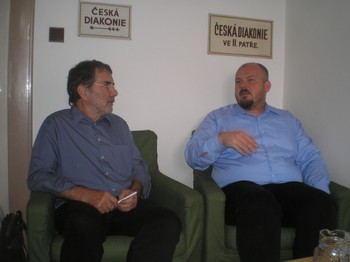For Diakonie, the social service arm of the Evangelical Church of Czech Brethren (ECCB) ― the Presbyterian Church (U.S.A.)’s partner church in this former Soviet bloc country ― the challenges of social ministry are two-fold: meeting prodigious need and creating a cultural climate in which the human dignity of those in need is respected.
The ECCB must also do this ministry in one of the most secular countries in the world ― 90 percent of the Czech population is unchurched.
Diakonie ― which is separately incorporated but nevertheless closely tied to the ECCB ― is on a fast track. “This work only started about 20 years ago,” says David Sourek, director of diaconal ministries for the church. “Nothing of this sort was allowed under communism.”
In that two-decade span, Diakonie has grown to encompass 43 separate programs that employ 1,500 staff. ECCB diaconal programs address the elderly, the disabled, children, crisis and disaster response, employment, housing and shelter, and outreach to Roma ― frequently called Gypsies, one of the most discriminated against ethnic groups in the world.
“In addition to our services, we also work in changing the climate in society, which excludes so many,” Sourek says. “Part of the communist heritage is discrimination against those who are considered ‘non-productive,’ so it’s a big challenge for Czechs to learn about human dignity.”
The Soviet system was built on “a socialist approach,” Sourek says, “which meant equal treatment of all people. Now we are trying to change to address needs according to wealth or poverty. It’s interesting to see how that will play out in our country.”
ECCB leaders are anxious to learn from church workers in the U.S. They have organized two 10-day visits to religious social service providers in the U.S. and two more are planned. So far 40 diaconal workers have visited programs in such places as Pennsylvania, Nebraska and Wisconsin “to learn and build relationships with PC(USA) congregations, networks and governing bodies,” Sourek says.
ECCB congregations don’t engage in direct social ministry, Sourek says, but support the ministries of Diakonie. “Before World War II churches weren’t allowed to do social ministry ― and after the war only the national church had the right. Today only the national church has the right to apply for government subsidies.”
Also, most ECCB congregations are too small to engage in effective social ministry.

Diakonie has created a media campaign, including posters similar to this one, to raise awareness of the contributions of older adults to Czech society. —Jerry L. Van Marter
The Czech social service delivery system is very different than in the U.S. Diakonie organizes programs to meet social need; the government provides assistance to individuals; individuals use that assistance to procure social services from Diakonie.
The system creates some sense of competition between the Czech government and Diakonie. “Diakonie is much more professional and can be more efficient,” Sourek says, “though the government’s professionalism has improved.”
Diakonie is also dipping its toes in the water of international assistance. “We know we’re a wealthy part of the world, so we have to support those in poorer areas,” Sourek says, noting Diakonie’s growing work in Africa and in refugee ministry.
Still, 98 percent of Diakonie’s social ministries expenditures are inside the Czech Republic.
Driving around Prague, one increasingly sees billboards that promote the dignity of the country’s senior population.. “This is a new project for us ― only in its second year,” Sourek says. “Seniors only tend to be visible in our society when there’s an accident of incident involving them. This campaign, which we’re doing with about 10 other social service agencies, is an attempt to portray real life in society. It includes radio and television spots promoting 10 goals to make Czech society more inclusive of seniors.”

